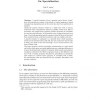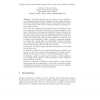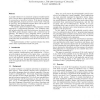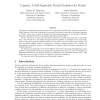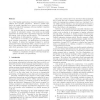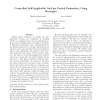117
click to vote
JFLP
2002
15 years 1 months ago
2002
We present a practical partial evaluation scheme for multi-paradigm declarative languages combining features from functional, logic, and concurrent programming. In contrast to pre...
132
click to vote
DAGSTUHL
1996
15 years 3 months ago
1996
A partial evaluator, given a program and a known "static" part of its input data, outputs a specialised or residual program in which computations depending only on the st...
129
click to vote
DAGSTUHL
1996
15 years 3 months ago
1996
As partial evaluation gets more mature, it is now possible to use this program transformation technique to tackle realistic languages and real-size application programs. However, t...
135
click to vote
PEPM
1992
ACM
15 years 6 months ago
1992
ACM
A partial evaluator is an automatic program transformation tool. Given as input a general program and part of its input, it can produce a specialized version. If the partial evalu...
135
click to vote
LOPSTR
1992
Springer
15 years 6 months ago
1992
Springer
We present a self-applicable partial evaluator for a large subset of full Prolog. The partial evaluator, called Logimix, is the result of applying our experience from partial eval...
PEPM
1993
ACM
15 years 6 months ago
1993
ACM
Applications of partial evaluation have so far mainly focused on generation of compilers from interpreters for programming languages. We partially evaluate a simple general LR(k) ...
123
click to vote
PEPM
1997
ACM
15 years 6 months ago
1997
ACM
Recently, Olivier Danvy introduced a new, simple method for implementing powerful partial evaluators, namely typedirected partial evaluation 9 . He introduced a partial evaluator ...
124
click to vote
PLDI
1997
ACM
15 years 6 months ago
1997
ACM
One of the flagship applications of partial evaluation is compilation and compiler generation. However, partial evaluation is usually expressed as a source-to-source transformati...
122
click to vote
ICCL
1998
IEEE
15 years 6 months ago
1998
IEEE
On-line partial evaluators are hardly ever selfapplicable, because the complexity of deciding whether to residualize terms causes combinatorial explosion when self-application is ...
118
click to vote
ERSHOV
1999
Springer
15 years 6 months ago
1999
Springer
Abstract. Existing partial evaluators usually fix the strategy for binding-time analysis. But a single strategy cannot fulfill all goals without leading to compromises regarding ...

